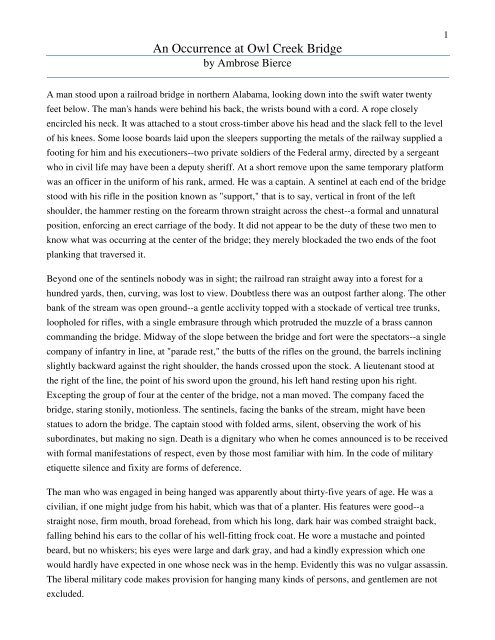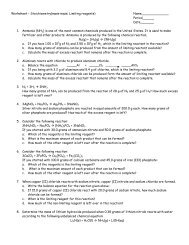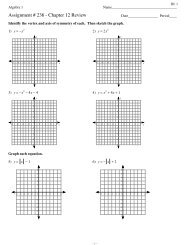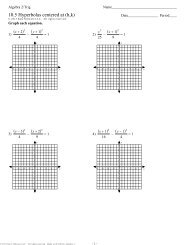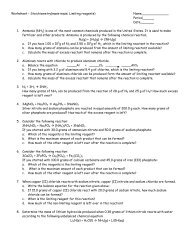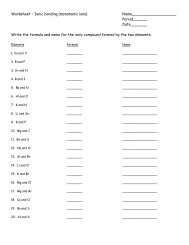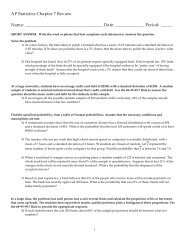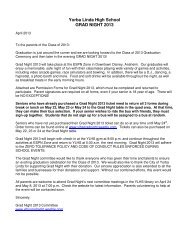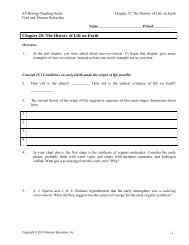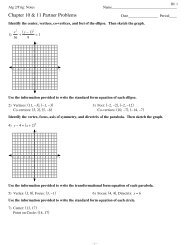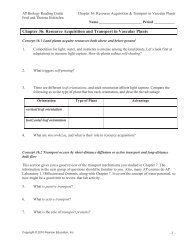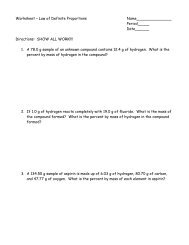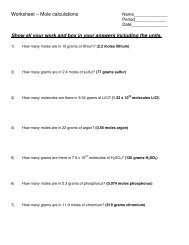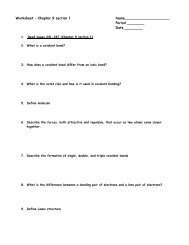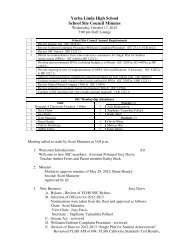short story - An Occurrence at Owl Creek Bridge.pdf
short story - An Occurrence at Owl Creek Bridge.pdf
short story - An Occurrence at Owl Creek Bridge.pdf
- No tags were found...
Create successful ePaper yourself
Turn your PDF publications into a flip-book with our unique Google optimized e-Paper software.
2The prepar<strong>at</strong>ions being complete, the two priv<strong>at</strong>e soldiers stepped aside and each drew away the plankupon which he had been standing. The sergeant turned to the captain, saluted and placed himselfimmedi<strong>at</strong>ely behind th<strong>at</strong> officer, who in turn moved apart one pace. These movements left thecondemned man and the sergeant standing on the two ends of the same plank, which spanned three ofthe cross-ties of the bridge. The end upon which the civilian stood almost, but not quite, reached afourth. This plank had been held in place by the weight of the captain; it was now held by th<strong>at</strong> of thesergeant. At a signal from the former the l<strong>at</strong>ter would step aside, the plank would tilt and thecondemned man go down between two ties. The arrangement commended itself to his judgment assimple and effective. His face had not been covered nor his eyes bandaged. He looked a moment <strong>at</strong> his"unsteadfast footing," then let his gaze wander to the swirling w<strong>at</strong>er of the stream racing madlybene<strong>at</strong>h his feet. A piece of dancing driftwood caught his <strong>at</strong>tention and his eyes followed it down thecurrent. How slowly it appeared to move, Wh<strong>at</strong> a sluggish stream!He closed his eyes in order to fix his last thoughts upon his wife and children. The w<strong>at</strong>er, touched togold by the early sun, the brooding mists under the banks <strong>at</strong> some distance down the stream, the fort,the soldiers, the piece of drift--all had distracted him. <strong>An</strong>d now he became conscious of a newdisturbance. Striking through the thought of his dear ones was a sound which he could neither ignorenor understand, a sharp, distinct, metallic percussion like the stroke of a blacksmith's hammer upon theanvil; it had the same ringing quality. He wondered wh<strong>at</strong> it was, and whether immeasurably distant ornear by--it seemed both. Its recurrence was regular, but as slow as the tolling of a de<strong>at</strong>h knell. Heawaited each stroke with imp<strong>at</strong>ience and--he knew not why--apprehension. The intervals of silencegrew progressively longer, the delays became maddening. With their gre<strong>at</strong>er infrequency the soundsincreased in strength and sharpness. They hurt his ear like the thrust of a knife; he feared he wouldshriek. Wh<strong>at</strong> he heard was the ticking of his w<strong>at</strong>ch.He unclosed his eyes and saw again the w<strong>at</strong>er below him. "If I could free my hands," he thought, "Imight throw off the noose and spring into the stream. By diving I could evade the bullets and,swimming vigorously, reach the bank, take to the woods and get away home. My home, thank God, isas yet outside their lines; my wife and little ones are still beyond the invader's farthest advance."As these thoughts, which have here to be set down in words, were flashed into the doomed man's brainr<strong>at</strong>her than evolved from it the captain nodded to the sergeant. The sergeant stepped aside.IIPeyton Farquhar was a well-to-do planter, of an old and highly respected Alabama family. Being aslave owner and like other slave owners a politician he was n<strong>at</strong>urally an original secessionist andardently devoted to the Southern cause. Circumstances of an imperious n<strong>at</strong>ure, which it is unnecessaryto rel<strong>at</strong>e here, had prevented him from taking service with the gallant army th<strong>at</strong> had fought the
4pressure upon his thro<strong>at</strong>, followed by a sense of suffoc<strong>at</strong>ion. Keen, poignant agonies seemed to shootfrom his neck downward through every fiber of his body and limbs. These pains appeared to flashalong well-defined lines of ramific<strong>at</strong>ion and to be<strong>at</strong> with an inconceivably rapid periodicity. Theyseemed like streams of puls<strong>at</strong>ing fire he<strong>at</strong>ing him to an intolerable temper<strong>at</strong>ure. As to his head, he wasconscious of nothing but a feeling of fulness--of congestion. These sens<strong>at</strong>ions were unaccompanied bythought. The intellectual part of his n<strong>at</strong>ure was already effaced; he had power only to feel, and feelingwas torment. He was conscious of motion. Encompassed in a luminous cloud, of which he was nowmerely the fiery heart, without m<strong>at</strong>erial substance, he swung through unthinkable arcs of oscill<strong>at</strong>ion,like a vast pendulum. Then all <strong>at</strong> once, with terrible suddenness, the light about him shot upward withthe noise of a loud splash; a frightful roaring was in his ears, and all was cold and dark. The power ofthought was restored; he knew th<strong>at</strong> the rope had broken and he had fallen into the stream. There was noadditional strangul<strong>at</strong>ion; the noose about his neck was already suffoc<strong>at</strong>ing him and kept the w<strong>at</strong>er fromhis lungs. To die of hanging <strong>at</strong> the bottom of a river!--the idea seemed to him ludicrous. He opened hiseyes in the darkness and saw above him a gleam of light, but how distant, how inaccessible! He wasstill sinking, for the light became fainter and fainter until it was a mere glimmer. Then it began to growand brighten, and he knew th<strong>at</strong> he was rising toward the surface--knew it with reluctance, for he wasnow very comfortable. "To be hanged and drowned," he thought? "th<strong>at</strong> is not so bad; but I do not wishto be shot. No; I will not be shot; th<strong>at</strong> is not fair."He was not conscious of an effort, but a sharp pain in his wrist apprised him th<strong>at</strong> he was trying to freehis hands. He gave the struggle his <strong>at</strong>tention, as an idler might observe the fe<strong>at</strong> of a juggler, withoutinterest in the outcome. Wh<strong>at</strong> splendid effort!--wh<strong>at</strong> magnificent, wh<strong>at</strong> superhuman strength! Ah, th<strong>at</strong>was a fine endeavor! Bravo! The cord fell away; his arms parted and flo<strong>at</strong>ed upward, the hands dimlyseen on each side in the growing light. He w<strong>at</strong>ched them with a new interest as first one and then theother pounced upon the noose <strong>at</strong> his neck. They tore it away and thrust it fiercely aside, its undul<strong>at</strong>ionsresembling those of a w<strong>at</strong>er snake. "Put it back, put it back!" He thought he shouted these words to hishands, for the undoing of the noose had been succeeded by the direst pang th<strong>at</strong> he had yet experienced.His neck ached horribly; his brain was on fire; his heart, which had been fluttering faintly, gave a gre<strong>at</strong>leap, trying to force itself out <strong>at</strong> his mouth. His whole body was racked and wrenched with aninsupportable anguish! But his disobedient hands gave no heed to the command. They be<strong>at</strong> the w<strong>at</strong>ervigorously with quick, downward strokes, forcing him to the surface. He felt his head emerge; his eyeswere blinded by the sunlight; his chest expanded convulsively, and with a supreme and crowningagony his lungs engulfed a gre<strong>at</strong> draught of air, which instantly he expelled in a shriek!He was now in full possession of his physical senses. They were, indeed, pretern<strong>at</strong>urally keen andalert. Something in the awful disturbance of his organic system had so exalted and refined them th<strong>at</strong>they made record of things never before perceived. He felt the ripples upon his face and heard theirsepar<strong>at</strong>e sounds as they struck. He looked <strong>at</strong> the forest on the bank of the stream, saw the individualtrees, the leaves and the veining of each leaf--saw the very insects upon them: the locusts, the brilliant-
5bodied flies, the grey spiders stretching their webs from twig to twig. He noted the prism<strong>at</strong>ic colors inall the dewdrops upon a million blades of grass. The humming of the gn<strong>at</strong>s th<strong>at</strong> danced above theeddies of the stream, the be<strong>at</strong>ing of the dragon flies' wings, the strokes of the w<strong>at</strong>er-spiders' legs, likeoars which had lifted their bo<strong>at</strong>--all these made audible music. A fish slid along bene<strong>at</strong>h his eyes andhe heard the rush of its body parting the w<strong>at</strong>er.He had come to the surface facing down the stream; in a moment the visible world seemed to wheelslowly round, himself the pivotal point, and he saw the bridge, the fort, the soldiers upon the bridge,the captain, the sergeant, the two priv<strong>at</strong>es, his executioners. They were in silhouette against the bluesky. They shouted and gesticul<strong>at</strong>ed, pointing <strong>at</strong> him. The captain had drawn his pistol, but did not fire;the others were unarmed. Their movements were grotesque and horrible, their forms gigantic.Suddenly he heard a sharp report and something struck the w<strong>at</strong>er smartly within a few inches of hishead, sp<strong>at</strong>tering his face with spray. He heard a second report, and saw one of the sentinels with hisrifle <strong>at</strong> his shoulder, a light cloud of blue smoke rising from the muzzle. The man in the w<strong>at</strong>er saw theeye of the man on the bridge gazing into his own through the sights of the rifle. He observed th<strong>at</strong> it wasa grey eye and remembered having read th<strong>at</strong> grey eyes were keenest, and th<strong>at</strong> all famous marksmenhad them. Nevertheless, this one had missed.A counter-swirl had caught Farquhar and turned him half round; he was again looking into the foreston the bank opposite the fort. The sound of a clear, high voice in a monotonous singsong now rang outbehind him and came across the w<strong>at</strong>er with a distinctness th<strong>at</strong> pierced and subdued all other sounds,even the be<strong>at</strong>ing of the ripples in his ears. Although no soldier, he had frequented camps enough toknow the dread significance of th<strong>at</strong> deliber<strong>at</strong>e, drawling, aspir<strong>at</strong>ed chant; the lieutenant on shore wastaking a part in the morning's work. How coldly and pitilessly--with wh<strong>at</strong> an even, calm inton<strong>at</strong>ion,presaging, and enforcing tranquillity in the men--with wh<strong>at</strong> accur<strong>at</strong>ely measured intervals fell thosecruel words:"Attention, company! . . Shoulder arms! . . . Ready! . . . Aim! . . . Fire!"Farquhar dived--dived as deeply as he could. The w<strong>at</strong>er roared in his ears like the voice of Niagara, yethe heard the dulled thunder of the volley and, rising again toward the surface, met shining bits ofmetal, singularly fl<strong>at</strong>tened, oscill<strong>at</strong>ing slowly downward. Some of them touched him on the face andhands, then fell away, continuing their descent. One lodged between his collar and neck; it wasuncomfortably warm and he sn<strong>at</strong>ched it out.As he rose to the surface, gasping for bre<strong>at</strong>h, he saw th<strong>at</strong> he had been a long time under w<strong>at</strong>er; he wasperceptibly farther down stream nearer to safety. The soldiers had almost finished reloading; the metalramrods flashed all <strong>at</strong> once in the sunshine as they were drawn from the barrels, turned in the air, andthrust into their sockets. The two sentinels fired again, independently and ineffectually.
6The hunted man saw all this over his shoulder; he was now swimming vigorously with the current. Hisbrain was as energetic as his arms and legs; he thought with the rapidity of lightning.The officer," he reasoned, "will not make th<strong>at</strong> martinet's error a second time. It is as easy to dodge avolley as a single shot. He has probably already given the command to fire <strong>at</strong> will. God help me, Icannot dodge them all!"<strong>An</strong> appalling plash within two yards of him was followed by a loud, rushing sound, diminuendo, whichseemed to travel back through the air to the fort and died in an explosion which stirred the very river toits deeps!A rising sheet of w<strong>at</strong>er curved over him, fell down upon him, blinded him, strangled him! The cannonhad taken a hand in the game. As he shook his head free from the commotion of the smitten w<strong>at</strong>er heheard the deflected shot humming through the air ahead, and in an instant it was cracking andsmashing the branches in the forest beyond."They will not do th<strong>at</strong> again," he thought; "the next time they will use a charge of grape. I must keepmy eye upon the gun; the smoke will apprise me--the report arrives too l<strong>at</strong>e; it lags behind the missile.Th<strong>at</strong> is a good gun."Suddenly he felt himself whirled round and round--spinning like a top. The w<strong>at</strong>er, the banks, theforests, the now distant bridge, fort and men--all were commingled and blurred. Objects wererepresented by their colors only; circular horizontal streaks of color--th<strong>at</strong> was all he saw. He had beencaught in a vortex and was being whirled on with a velocity of advance and gyr<strong>at</strong>ion th<strong>at</strong> made himgiddy and sick. In a few moments he was flung upon the gravel <strong>at</strong> the foot of the left bank of thestream--the southern bank--and behind a projecting point which concealed him from his enemies. Thesudden arrest of his motion, the abrasion of one of his hands on the gravel, restored him, and he weptwith delight. He dug his fingers into the sand, threw it over himself in handfuls and audibly blessed it.It looked like diamonds, rubies, emeralds; he could think of nothing beautiful which it did notresemble. The trees upon the bank were giant garden plants; he noted a definite order in theirarrangement, inhaled the fragrance of their blooms. A strange, rose<strong>at</strong>e light shone through the spacesamong their trunks and the wind made in their branches the music of Æolian harps. He had no wish toperfect his escape--was content to remain in th<strong>at</strong> enchanting spot until retaken.A whiz and r<strong>at</strong>tle of grapeshot among the branches high above his head roused him from his dream.The baffled cannoneer had fired him a random farewell. He sprang to his feet, rushed up the slopingbank, and plunged into the forest.
“<strong>An</strong> <strong>Occurrence</strong> <strong>at</strong> <strong>Owl</strong> <strong>Creek</strong> <strong>Bridge</strong>” by Ambrose Bierce / TB Assignment8While you read…As you actively read the <strong>story</strong>, write down your feelings, thoughts, or observ<strong>at</strong>ions. Wh<strong>at</strong>developments make you afraid for the hero? When do you feel relieved or even happy for him? Wh<strong>at</strong>doubts, questions, or other reactions arise in your mind? Wh<strong>at</strong> can you predict will happen?Comprehension –1. St<strong>at</strong>e the situ<strong>at</strong>ion Peyton Farquhar faces in Part 1.2. Part 2 of the Story is a flashback. List its events in chronological order.3. How much time actually elapses between the opening and closing lines of Part 3?4. Summarize in one sentence wh<strong>at</strong> Farquhar imagines in Part 3.5. Wh<strong>at</strong> point of view does Bierce use in each part?Part 1 - ____________ Part 2 - ____________ Part 3 - ___________Interpret<strong>at</strong>ion –6. Review the notes you made while reading the <strong>story</strong>. How did Bierce manipul<strong>at</strong>e your feelings?How did he prepare you for the ending?7. Do you think Bierce tries to enlist your symp<strong>at</strong>hies for either the Union or the Confeder<strong>at</strong>e side ordoes the <strong>story</strong> seem to be focused more on a general theme about the n<strong>at</strong>ure of war? Why do you thinkthe way you do? Cite evidence from the <strong>story</strong> to support your answer.8. The third part of the <strong>story</strong>, which occurs the few seconds before Farquhar dies, is presumably afantasy. Wh<strong>at</strong> evidence is seen in this part to foreshadow Farquhar’s ultim<strong>at</strong>e demise?9. Wh<strong>at</strong> does this <strong>story</strong> reveal about the psychology of a person in a life-or-de<strong>at</strong>h situ<strong>at</strong>ion? On thebasis of personal experience or of true-life stories you know about, do you find this psychologybelievable of far-fetched? Explain.10. The critics Cleanth Brooks and Robert Penn Warren said th<strong>at</strong> Bierce’s <strong>story</strong> depends too much on aquirk of human psychology and is thus a mere “case study” th<strong>at</strong> does not reveal anything importantabout human n<strong>at</strong>ure, as good fiction does. Do you agree? Why or why not?


